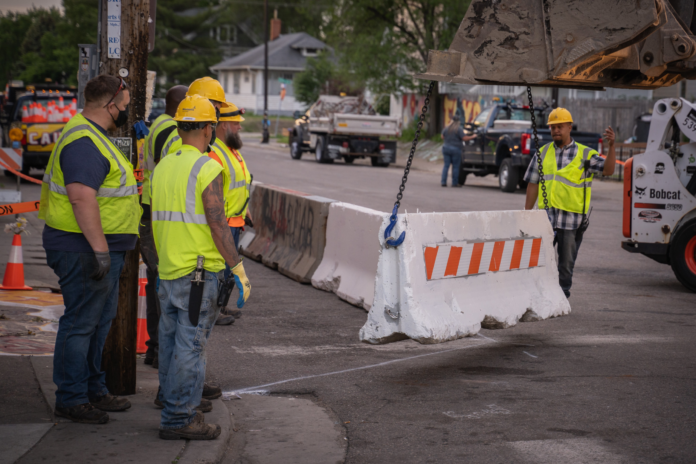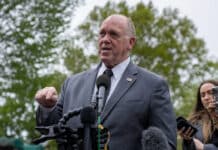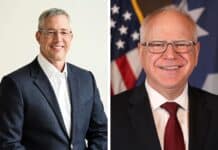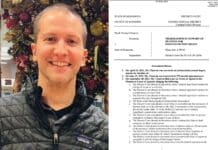City workers descended on the intersection of 38th and Chicago Avenue South before daybreak on Thursday and began removing and dismantling the barricades that have been in place for over a year in the area referred to as George Floyd Square.
The city is here. #nojusticenostreets #minneapolis #JusticeForGeorgeFloyd pic.twitter.com/NY0U5D4lcm
— marciahoward38thstreet (@marciaxthree) June 3, 2021
After city crews left, however, activists had replaced make-shift barricades across some of the intersections in the area by 11 a.m., and again vowed to hold the street until their demands are met.
Aaaaaand it's shut down again.
Day 374 of the hostage situation.#NoGoZone
— CrimeWatchMpls (@CrimeWatchMpls) June 3, 2021
A four square-block area surrounding the intersection of East 38th Street and Chicago Avenue South in Minneapolis, the site where George Floyd died while in police custody last May, has been barricaded and under activists’ control since Floyd’s death.
The group holding quarters at the intersection is backed by the National Lawyers Guild, and they say they won’t relinquish control of the area until their list of 24 demands is met. The demands include the firing four Bureau of Criminal Apprehension employees as well as Hennepin County Attorney Mike Freeman. The activists are also demanding $400,000 for investments to create new jobs in the area, and $300,000 for anti-racism training for the surrounding community.
Minneapolis Mayor Jacob Frey issued a joint statement with City Council Vice President Andrea Jenkins and City Council Member Alondra Cano later Thursday morning claiming that the street “reconnection” project was a “community-led” effort facilitated by a group called Agape Movement.
Agape is a nonprofit comprised of mostly former gang members who purport to “create better options for young Black men so they don’t get sucked into the gang lifestyle,” the Star Tribune reported.
The group has come under fire by activists and their supporters, however, for its contracts with the city ranging from $25,000 and up to $359,000, some of which are reported to be tied to the reopening of 38th and Chicago.
Minneapolis spokesperson tells @mprnews that city has contract with Agape running until this fall tied to the reopening of 38th and Chicago for up to $359,000 max for community building, health, and safety services. Also had previous contracts with city.
— Jon Collins (@JonSCollins) June 4, 2021
This morning, the city of Minneapolis tried (And FAILED) to retake George Floyd Square. Fuck you, Frey, you lying weasely shit. Fuck the collaborators of Agape, too.
— BarryPoppins (FREE OF barrypoppins) (@BarryPoppins1) June 4, 2021
Activist Marcia Howard, who has been acting as a sentry at George Floyd Square for several months, posted a brief video after the barricades went back up and reiterated the vow of “no justice, no street.”
Just another day in the Zone. #nojusticenostreets #minneapolis #stopkillingus #sayhisname #JusticeForGeorgeFloyd #winstonsmithjr #winstonsmith pic.twitter.com/z1XBxxrOZr
— marciahoward38thstreet (@marciaxthree) June 4, 2021
By 6 p.m. Thursday, an additional iron fist had been placed at the intersection of 39th and Chicago, in addition to the one already placed at 38th and Chicago.
Another fist has been placed at the south Barricade near 39th and Chicago. @MPRnews pic.twitter.com/hjYxBvKWEJ
— Evan Frost (@efrostee) June 3, 2021
By Friday morning, barricades at other areas of the zone had been refortified.
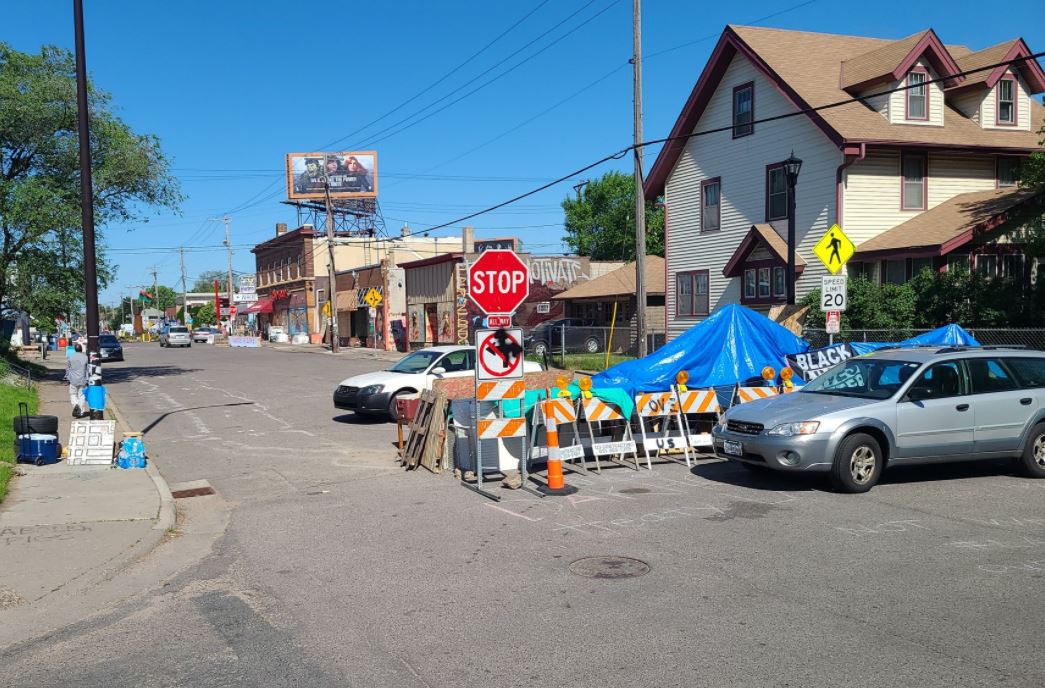
Since last summer, the area has been plagued with violence including several murders and numerous shootings. There have been several incidents where police have said they were harassed or were not allowed into the area to respond. In April, a woman was reportedly pushed out of a window during a domestic incident on the edge of one of the barricaded streets. Despite the fact that 911 was told that she was badly cut and bleeding, police dispatch audio from the incident indicated that she was asked to meet police a block away from the area.
The city of Minneapolis first vowed to remove the barricades and open the street to traffic by August 17, 2020. However, the barricades remained.
Again in March of this year, city leaders including the mayor and Police Chief Medaria Arradondo vowed to open the area to traffic after the Derek Chauvin trial. The verdict in the Chauvin trial was reached on April 20, and the barricades have remained.
With the latest tug-of-war between the city and activists, it’s unclear when the streets will actually be opened to freely moving public traffic access.
– – –
Minnesota Crime Watch & Information publishes news, info and commentary about crime, public safety and livability issues in Minneapolis, the Twin Cities and Greater Minnesota.





